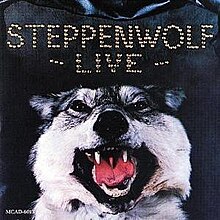
Steppenwolf was a Canadian rock band formed in Los Angeles in 1967. The group was founded by singer/rhythm guitarist John Kay, keyboardist Goldy McJohn and drummer Jerry Edmonton, all formerly of the Canadian band The Sparrows. Guitarist Michael Monarch and bassist Rushton Moreve were recruited via notices placed in Los Angeles-area record and musical instrument stores.

Gerald Michael Edmonton was a Canadian musician who was the drummer and secondary lead vocalist for the rock band Steppenwolf.

Nick St. Nicholas is a German-born Canadian bandleader, bass guitarist, singer and songwriter; best known for his partnership in Steppenwolf.

Michael Monarch is an American guitarist. He is best known for his work with the band Steppenwolf.

Steppenwolf is the debut studio album by Canadian-American rock band Steppenwolf, released on January 29, 1968, on ABC Dunhill Records. It includes songs written by band members and songs written by others such as the Willie Dixon blues classic "Hoochie Coochie Man", retitled "Hootchie Kootchie Man".
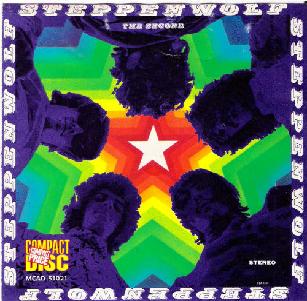
The Second is the second studio album by Canadian-American rock band Steppenwolf, released in October 1968 on ABC Dunhill Records. The album contains one of Steppenwolf's most famous songs, "Magic Carpet Ride". The background of the original ABC LP cover was a shiny "foil", in contrast to later LP issues and the modern CD sleeve.

Early Steppenwolf is a collection of live recordings by Steppenwolf when they were still known as "The Sparrow" [nee: "The Sparrows"]. It was released in July 1969 on the ABC Dunhill Records label.

Monster is the fourth studio album by Canadian-American rock band Steppenwolf. The album was released in November 1969, by ABC Dunhill Records. It was their first LP with new lead guitarist Larry Byrom instead of Michael Monarch. The album was Steppenwolf's most political album, making references to important issues at the time, such as the Vietnam War.

Steppenwolf 7 is the fifth studio album by Canadian-American rock band Steppenwolf. The album was released in November 1970, by Dunhill Records. It is the first Steppenwolf album with new bass player George Biondo. The album’s numerical title reflects the fact that it was the band’s seventh album release for ABC/Dunhill records . While the album featured Steppenwolf's trademark rock and roll sounds, none of the songs were able to make the top 40. The album featured a cover of Hoyt Axton's "Snowblind Friend", their second cover of one of his antidrug songs. Along with "Who Needs Ya", it was one of two singles from the album which made the charts, but fell short of the top 40. The album track "Renegade" is autobiographical for lead vocalist John Kay, recounting his flight with his mother from the Soviet occupation zone to the West in 1948. The intro to "Earschplittenloudenboomer" is spoken by Kay partially in German.
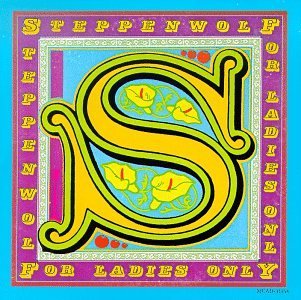
For Ladies Only is the sixth studio album by Canadian-American rock band Steppenwolf. The album was released in November 1971, by Dunhill Records. It is a political concept album mainly about feminism but with several more conventional songs about romance as well, both unusual themes for Steppenwolf. Some critics saw the album as sexist, citing the lyrics of the songs and a photo of a car shaped like a penis alongside the Hollywood Walk of Fame in the gatefold. The album saw the band hinting toward the progressive rock movement that was popular at the time with more complex arrangements and sophisticated keyboard playing, particularly on the title track. Like their previous album, it was accompanied by two minor hit singles which fell just short of the Top 40.

16 Greatest Hits is a compilation album by Steppenwolf, released in 1973. It features some of their most famous songs, including "Born to Be Wild", "The Pusher", and "Magic Carpet Ride", and "Hey Lawdy Mama." The album consisted of the 11 tracks from the previous Gold: Their Great Hits album, in the same order as on the two sides of that earlier album, with the addition of the final two tracks on side 1, and the final three tracks on side 2.

Project: Mersh is the final extended play by American punk rock trio Minutemen, released on April 8, 1985 through SST Records. It is the band's penultimate release before the death of frontman and composer D. Boon later that year due to injuries sustained in an auto accident.

"The Pusher" is a rock song written by Hoyt Axton, made popular by the 1969 movie Easy Rider which used Steppenwolf's version to accompany the opening scenes showing drug trafficking.

Gold: Their Great Hits is a greatest hits album released by the Canadian-American hard rock band Steppenwolf. The album, released in 1971, charted at #24 on the Billboard Pop Albums charts and was certified "gold" by the RIAA on April 12, 1971. Initial pressings of the album came in a gatefold sleeve, with a detachable poster of the band.

Kent Henry Plischke, known as Kent Henry, was an American guitarist and songwriter best known for his contributions to Steppenwolf and Blues Image.
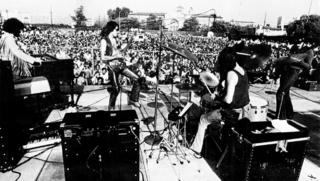
The discography of Steppenwolf, a Canadian-American Hard rock band, consists of 13 studio albums, 14 compilation albums, 5 live albums, 41 singles, and three music videos. The band was formed in 1967 after some members of The Sparrows split. Group members included John Kay, Michael Monarch, Goldy McJohn, Rushton Moreve and Jerry Edmonton. Their first album, Steppenwolf, was released in 1968, which sold well and reached 6 on Billboard. That same year, Steppenwolf covered "The Pusher". The song was later used in Easy Rider. The album's most successful single was "Born to Be Wild", which reached No. 2 on the Billboard. At the time of the release of second album, The Second, the band's bassist Rushton Moreve had a dispute with band leader John Kay, and was eventually replaced with Nick St. Nicholas. The album's single was "Magic Carpet Ride" which reached number 3 on Billboard.
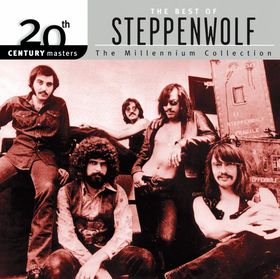
20th Century Masters – The Millennium Collection: The Best of Steppenwolf, released by Universal Music as part of their 20th Century Masters – The Millennium Collection series, is a CD that collects material by Steppenwolf from 1968 to 1971. The compilation focuses on Steppenwolf’s Dunhill recordings, with the bulk of material coming from their Steppenwolf through At Your Birthday Party albums. While generally regarded as a solid representation of Steppenwolf’s early-period proto-metal work from the 1960s, there were no new tracks or previously unreleased songs included. It includes liner notes by Joseph Laredo and was digitally remastered by Erick Labson. It was certified Gold by the Recording Industry Association of America on October 29, 2004, the first output by Steppenwolf to earn such a designation since 16 Greatest Hits went gold on April 12, 1971.
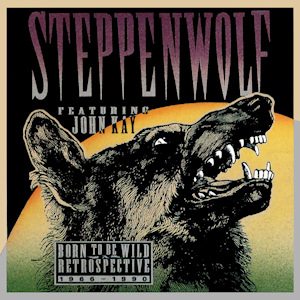
Born to Be Wild – A Retrospective is a 1991 greatest hits album by Steppenwolf. It was the first attempt at a serious historical overview of the band and its founder/leader's career.

John Raymond Goadsby, known as Goldy McJohn, was a Canadian keyboard player best known as the original keyboardist for rock group Steppenwolf. Originally a classically trained pianist, he was a pioneer in the early use of the electronic organ in heavy metal.
